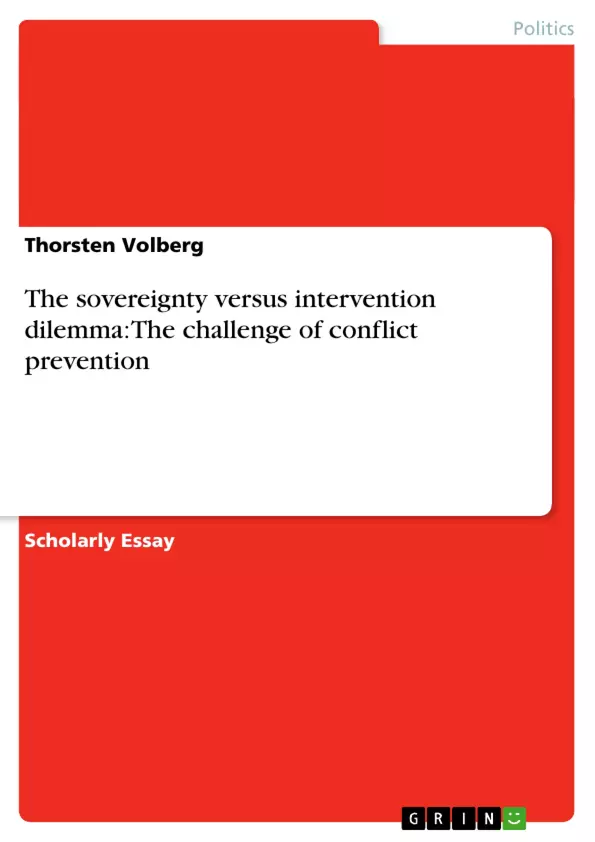In some regions of the world a fundamental development crisis has increased the contradictory situation inside of society and the struggle of distribution. Deformed and failed processes of modernization and transformation manifest and cause a politicised society. Ethnic struggles, failing states and social processes of chaos lead to warlike conflicts and political structures have to be installed while the economy and the society are influenced by force. With a focus on - often only formally existing - states of Subsahara Africa, a World Bank Discussion Paper even describes the current status of many of these countries as a „stable situation of instability“. A situation that often leads to so called “political economies of threat and combat” which includes a growing number of people who have an interest in the maintenance of the conflict and a high propensity to violence. An important challenge of the international community is to deal with the possibilities of a preventive policy to minimize the chances of such a political radicalization. Furthermore the question remains of how to react, if state failures finally lead to massive human rights violations and even genocide within those countries.
Inhaltsverzeichnis (Table of Contents)
- Introduction
- Conflict Prevention on the agenda
- Preventive Policy
- ICISS Root Cause Prevention efforts
- ICISS Direct Prevention efforts
- The legal ground of Preventive Policy
- Difficulties of Conflict Prevention Policy
- Target states
- International Community
- Political response
- Coordination
- Encouragement
- The role of Humanitarian Assistance in Conflict Prevention
- Conclusion
Zielsetzung und Themenschwerpunkte (Objectives and Key Themes)
This work explores the complex relationship between state sovereignty and international intervention in the context of conflict prevention. It examines the challenges of preventing violent conflict and the role of the international community in supporting states in this effort. The author analyzes the legal and moral justifications for intervention, as well as the political and practical obstacles to effective prevention.
- The relationship between state sovereignty and international intervention
- The challenges of preventing violent conflict
- The role of the international community in conflict prevention
- The legal and moral justifications for intervention
- The political and practical obstacles to effective prevention
Zusammenfassung der Kapitel (Chapter Summaries)
- Introduction: The introduction establishes the context of the work, highlighting the increasing incidence of violent conflict in developing countries, particularly in Sub-Saharan Africa. It emphasizes the need for preventive policies to mitigate the risks of political radicalization and state failure.
- Conflict Prevention on the agenda: This chapter examines the changing geopolitical landscape after the Cold War, focusing on the emergence of new conflicts and the growing recognition of the importance of preventing violent conflict. The chapter discusses the key actors and initiatives in the field of conflict prevention, including the UN, the OECD, and the European Union.
- Preventive Policy: This chapter delves into the ICISS report "The Responsibility to Protect" and its framework for preventing deadly conflict. It emphasizes the primary responsibility of states in ensuring fair treatment and opportunities for all citizens, and outlines key strategies for conflict prevention, including development assistance and efforts to promote good governance and human rights.
- Difficulties of Conflict Prevention Policy: This chapter addresses the challenges faced by the international community in implementing effective conflict prevention policies. It discusses the complexities of engaging with target states and coordinating efforts among international actors.
- Political Response: This chapter explores various political responses to the challenge of conflict prevention, including coordination of international efforts, encouragement of state initiatives, and the role of humanitarian assistance.
Schlüsselwörter (Keywords)
This text focuses on the key concepts of state sovereignty, international intervention, conflict prevention, human rights, good governance, political radicalization, and state failure. It analyzes the legal and moral justifications for intervention, examines the challenges of implementing effective prevention strategies, and discusses the role of the international community in supporting states in their efforts to prevent violent conflict.
Frequently Asked Questions
What is the "sovereignty versus intervention" dilemma?
The dilemma refers to the conflict between a state's right to non-interference (sovereignty) and the international community's moral or legal obligation to intervene when massive human rights violations or state failures occur.
What is the "Responsibility to Protect" (R2P)?
Derived from the ICISS report, R2P is a framework stating that sovereign states have the primary responsibility to protect their citizens, but if they fail, the international community has the responsibility to intervene.
Why is conflict prevention particularly challenging in Sub-Saharan Africa?
Many states in the region face "stable situations of instability," where failed modernization, ethnic struggles, and political economies of threat create a high propensity for violence and radicalization.
What are the root causes of state failure discussed in the text?
Root causes include development crises, deformed modernization processes, struggles over resource distribution, and the lack of good governance and human rights.
How can the international community support conflict prevention?
Support can be provided through development assistance, coordination of international efforts, humanitarian aid, and encouraging states to implement good governance and human rights protections.
- Citation du texte
- Thorsten Volberg (Auteur), 2006, The sovereignty versus intervention dilemma: The challenge of conflict prevention, Munich, GRIN Verlag, https://www.grin.com/document/50376



